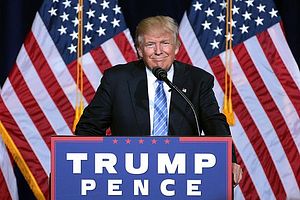President Tsai Ing-wen of Taiwan recently became the first in her position to make a congratulatory call to the president-elect of the United States. The call sends important signals to other world leaders about the tone of U.S.-Taiwan ties under the upcoming Donald Trump administration.
Much certainly remains unknown about potential shifts in U.S. East Asia policy planned by the new administration. Campaign rhetoric has shown Trump’s apparent willingness to pull back from the traditional U.S. role as security guarantor in East Asia.
Many in Taiwan, however, do not seem too worried about the potential for change. President-elect Trump’s national security advisers are seen as pro-Taiwan, and the Republican National Committee included then-President Ronald Reagan’s 1982 “six assurances” in its official party platform for the first time ever. A post-election editorial in the Taipei Times, Taiwan’s largest English language newspaper, expressed the view that the new administration’s Taiwan stance might not be “too remote” from previous Republican administrations.
Reaction to the Trump-Tsai call in Taiwan has been positive. Taiwan Thinktank researcher Dr. Lai I-Chung sees the phone call as essentially an opportunity to build mutual trust. Lai thinks it will set the stage for a better relationship going forward. Likewise, a researcher at Taiwan’s National Chengchi University described the call as a “positive thing,” and noted that Trump’s opposition to multilateral trade might provide an opportunity advance the Taiwan-U.S. Trade and Investment Framework Agreement (TIFA). A Taiwan government spokesperson was mum on the details of the call, but reiterated the point that Taiwan’s positive relations with China and the United States are equally important to both Taiwan and to regional peace and stability. Even Hu Wen-chi, Culture and Communications Committee deputy director for the opposition Kuomintang, expressed thanks toward the United States for supporting the Republic of China.
Much of the Taiwanese sentiment toward the incoming Trump administration is also connected to Trump’s rhetoric on China. But the degree to which a tough line on China translates into a pro-Taiwan stance remains to be seen.
First is the question of China’s penchant for aggression in its “near seas” and potentially toward Taiwan. Tsai’s election has been rightly perceived by China as the failure of previous efforts to generate a more pro-Chinese sentiment in Taiwan through enhancing cross-strait economic links. Since Tsai’s inauguration in May of 2016, China has closed down several official links, and threatened the island against moves toward independence.
Second is the uncertainty of how a President Trump might choose to respond to Chinese aggressiveness toward Taiwan. Officially, the Taiwan Relations Act of 1979 establishes a U.S. defense of Taiwan in the event of unprovoked aggression. The potential for military arms sales under a new Republican administration pleases many in Taiwan, but many experts see the chances of the United States stepping in to defend Taiwan in the event of hostilities as a tall order given the high economic and security stakes in U.S.-China relations. Some Taiwan watchers have found it unsettling to see Trump’s apparent willingness to accept Russian aggression in Ukraine, drawing parallels to potential Chinese aggression toward Taiwan.
The aspect of Trump’s platform which seems most out of step with a pro-Taiwan policy is his call to withdraw from the Trans-Pacific Partnership (TPP). While Trump’s concern here is primarily domestic, the TPP is widely acknowledged to have important security implications. However, should the United States decide to pull out of the deal, Taiwan would not be the only country in East Asia left looking for alternatives to China’s proposed trade deal, the Regional Comprehensive Economic Partnership (RCEP).
The phone call between Tsai and Trump is an early and public display of a pro-Taiwan U.S. position, one which is surely welcomed by both Taiwanese and U.S. policymakers invested in Taiwan’s future.
Andrew Greve is a Ph.D. candidate in Political Science at Rutgers University. His focus is on US foreign policy toward East Asia. He holds a Master’s degree from National Sun Yat-sen University in Kaohsiung, Taiwan.

































